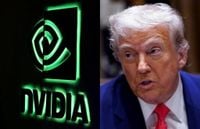The escalating trade tensions between the United States and China have hit the semiconductor sector hard. On Wednesday, April 16, 2025, stocks of Nvidia (NASDAQ:NVDA) and AMD (NASDAQ:AMD), two of the world's largest chip manufacturers, fell more than 6% due to new export restrictions imposed by the U.S. government affecting their sales to China. Nvidia's Brazilian Depositary Receipt (BDR) fell by 7.0%, while AMD's BDR dropped by 5.7% during trading.
Nvidia revealed that it will be required to obtain a license to sell its H20 chips to China, a permission that is unlikely to be granted. The company also announced that this measure will result in a write-down of $5.5 billion this quarter, affecting inventories and already contracted sales. The H20 chip was specifically developed for the Chinese market, complying with previous U.S. restrictions. Despite its reduced power, it still poses a risk as it can be used in building supercomputers capable of simulating wars and nuclear tests, which is the central reason behind the American sanctions.
Meanwhile, AMD announced potential losses of up to $800 million related to the new requirements for selling its MI308 chips to China. Like Nvidia, the company will attempt to obtain licenses but acknowledges that there is no guarantee of approval. Since 2022, the U.S. has been tightening controls on exports of sensitive technologies to China in an effort to curb the Chinese advance in areas such as artificial intelligence and defense.
Analysts warn that these restrictions are likely to intensify, potentially becoming permanent policies. This scenario pressures American companies to redirect production and investments away from China, while also raising a global alarm about the risks of technological dependence amid the growing rivalry between the two largest powers in the world. Since its peak in January 2025, Nvidia shares have accumulated a loss of almost 30%, with AMD following a similar trajectory.
On Tuesday, April 15, 2025, Nvidia had already reported that it would take on charges of $5.5 billion after the U.S. government announced it would require licenses for exports of its H20 AI chip to China, one of its most popular products. The U.S. government informed Nvidia on April 9 that the H20 chip would require a license for export to China. Then, on April 14, it confirmed that these rules would be in effect indefinitely. The document from Nvidia does not specify how many licenses, if any, the U.S. government may grant. Nvidia has not provided further details. The U.S. Department of Commerce, which oversees the country's export controls, did not immediately respond to a request for comment.
The $5.5 billion charges are associated with H20 products for inventory, purchase commitments, and related reserves. This announcement came a day after Nvidia revealed plans to invest up to $500 billion in AI infrastructure in the U.S. over the next four years, aligning with the Trump administration's efforts to boost domestic production.
In a related development, Nvidia shares fell more than 5% in pre-market trading on April 16, 2025, after the Trump administration blocked the sale of the company's chips to China. This isn't the first time the company has faced restrictions based on policy. Even before Trump's trade war, the U.S. was embroiled in a tech dispute with China, driven by fears that products exported to the country could be copied, violating patents. Earlier this year, China demonstrated that it does not need superchips to produce its own version of ChatGPT.
Despite a 16.5% decline in Nvidia shares in 2025, they remain up more than 30% over the past twelve months. Over a five-year span, the stock has appreciated by an astonishing 1,500%, largely due to Nvidia's acclaim as a market leader in producing processors to meet AI demand. Additionally, ASML, a Dutch company in the processor sector, has also faced pressure from the U.S. to halt its sales to China, leading to a more than 4% drop in its shares on April 16, 2025, following the release of weak sales estimates for the next cycle. Executives from ASML noted that they cannot make projections with confidence due to uncertainties linked to the trade war.
Global markets reacted negatively to these developments, with the Nasdaq technology index falling by 2.19% on April 16, 2025, while the S&P 500 and Dow Jones experienced declines of 1.42% and 0.72%, respectively. The Ibovespa (IBOV) in Brazil also saw a downtrend, dropping 0.29% around 11:15 AM to 128,870 points. The dollar initially opened higher due to risk aversion but later corrected to a 0.26% decline against the real, priced at R$5.88.
Investors are closely monitoring retail sales in the U.S. for new signals regarding the strength of the American economy. Furthermore, Jerome Powell, the President of the U.S. Federal Reserve, is scheduled to speak at an event, which could offer insights into the economic landscape.
In light of these developments, the U.S. government has confirmed new export restrictions for Nvidia and AMD chips, stating that it is committed to acting in accordance with President Trump's directive to safeguard national and economic security. The Department of Commerce is issuing new export licensing requirements for the NVIDIA H20, AMD MI308, and their equivalents.
On April 15, 2025, the White House released a fact sheet indicating that China could face tariffs of up to 245% on exports to the U.S. if it takes new retaliatory measures. Currently, U.S. tariffs on Chinese imports stand at 145%. Last week, China raised retaliatory tariffs on U.S. products from 84% to 125%, but also indicated that it would no longer follow any new tariff increases from Washington, arguing that such actions would not make economic sense.
As the trade war intensifies, China has called on the United States to "stop threatening and blackmailing," after the White House shifted the responsibility onto Beijing to initiate negotiations aimed at de-escalating the trade conflict between the two economic giants.








